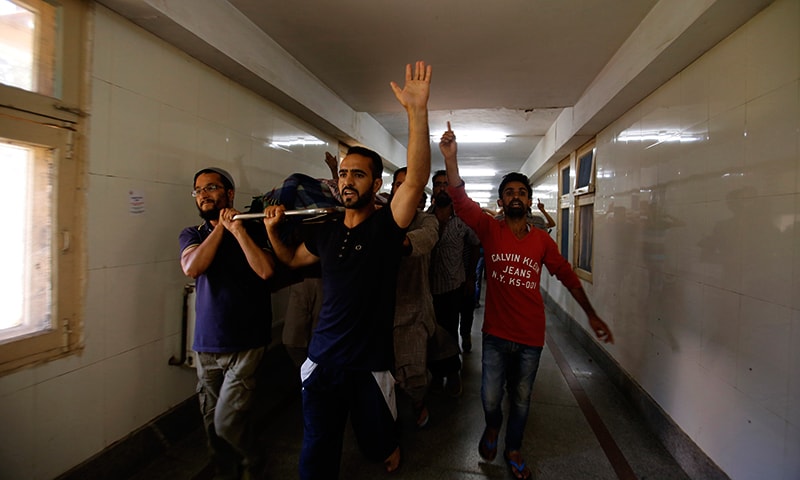SRINAGAR/ISLAMABAD: Indian security forces on Wednesday removed dozens of black and Pakistani flags in India-held Kashmir hoisted by residents observing “black day” on the call of Pakistan government to protest the killing of a top pro-independence militant leader.
Indian administration feared fresh trouble in the tense region after Prime Minister Nawaz Sharif called for observing a “black day” to express solidarity with “Kashmiris facing atrocities at the hands of Indian forces”.
In a statement, Nawaz said, “India should realise that when people decide to do something, the weapons cannot stop their way.”
Rubbishing Indian claim of Kashmir being its internal matter, Nawaz said: “Kashmir cannot be accepted as an internal matter of India as it has been declared a disputed territory by the United Nations.”

The largest street protests in recent years erupted after Indian troops on July 8 killed Burhan Wani, the popular 22-year-old leader of Hizbul Mujahideen.
Police and paramilitary soldiers in riot gear enforced a strict curfew for the 12th straight day Wednesday as life remained paralyzed and streets deserted in the region.
Responding to Nawaz's appeal, rallies were organised across the country condemning human rights violations by Indian security forces in held Kashmir.
Since 1989, more than 68,000 people have been killed in Kashmir's uprising against Indian rule and the subsequent Indian military crackdown.
Nawaz said India had promised the world to arrange a plebiscite in Kashmir, but such a commitment was yet to be honoured.

Earlier, India's External Affairs Ministry responded to Pakistan's call for a “black day” by saying Islamabad should stop “interfering in India's internal affairs and destabilising the situation”.
During the recent protests, clashes between the Indian forces and Kashmiris have left at least 47 people, mostly teens and young men, dead.
Hundreds of volunteers and people attending to the injured in the hospital gathered outside on the main road and offered prayers before his body was taken to his village for burial. They raised anti-India, pro-Pakistan and pro-freedom slogans.

Virtually no information was coming from most parts of India-held Kashmir, especially in the south where most of the killings have occurred, as cellular and internet services remained suspended.
Newspapers were forced to stop printing and access to landline connections was limited, except in Srinagar.















































